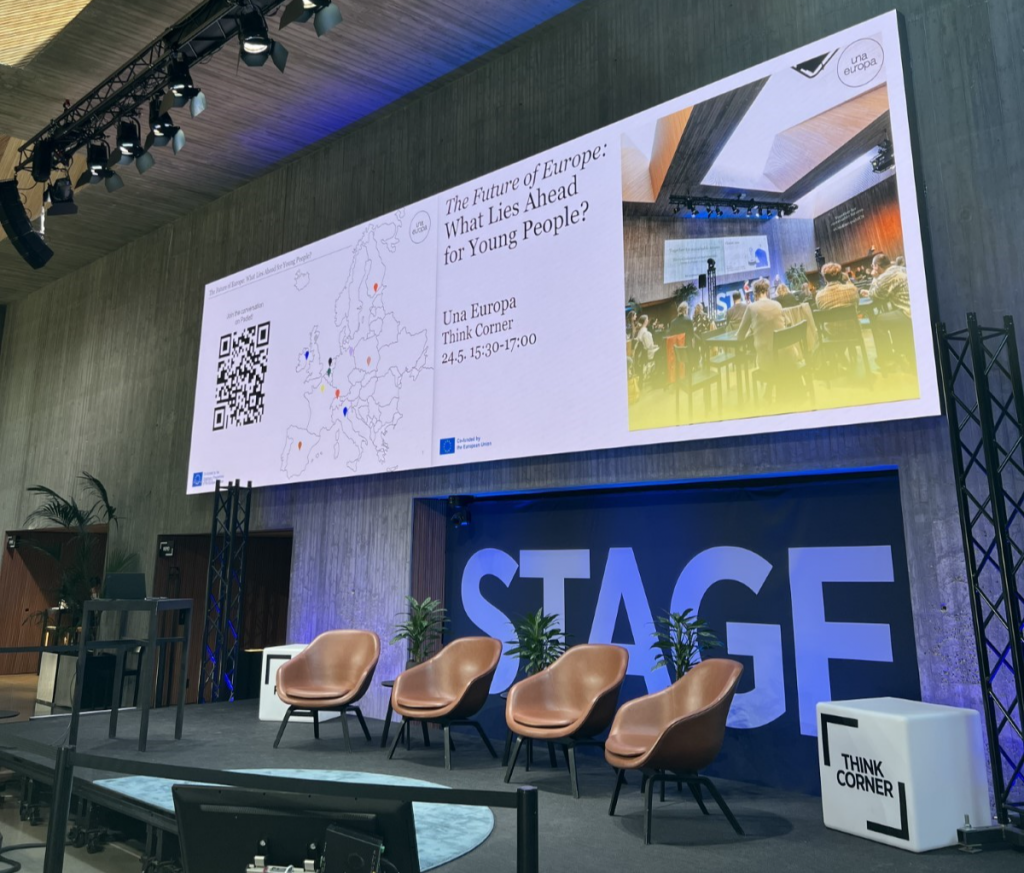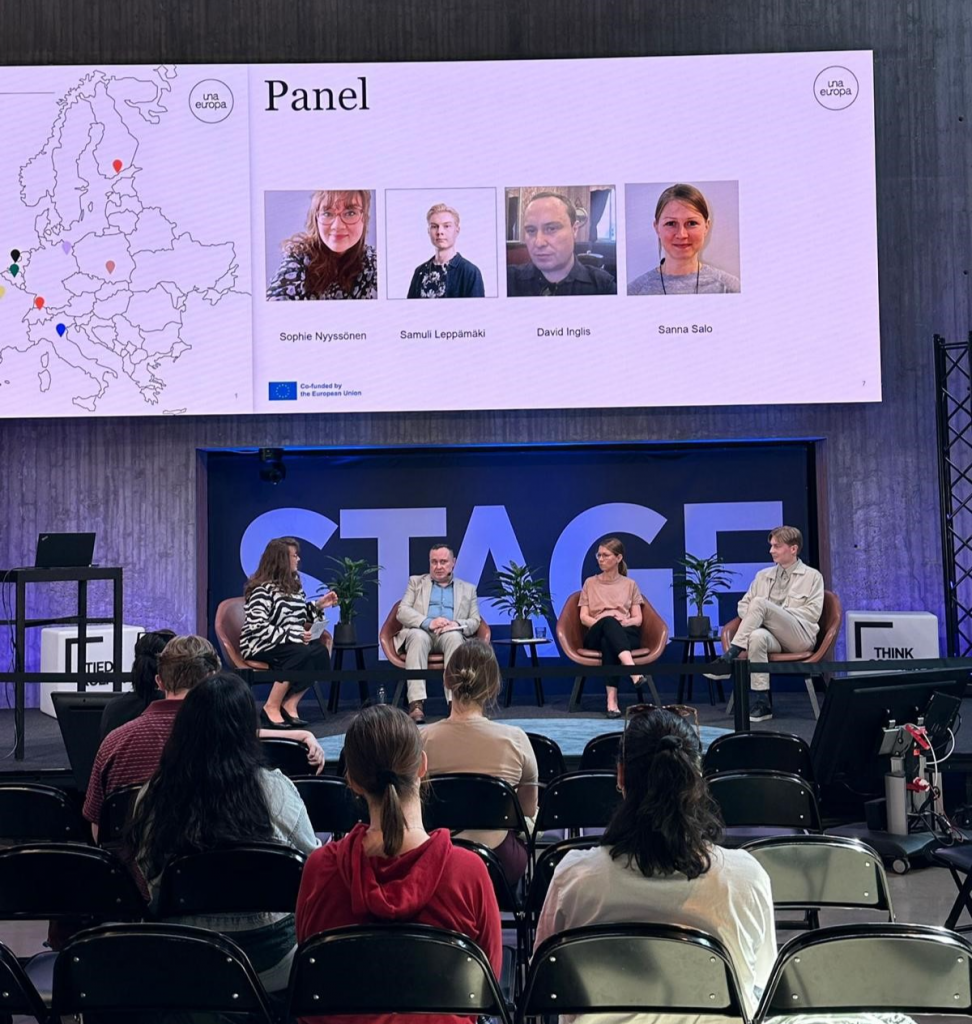This blog post is written by a member of the Local Task Force Logan Sunnarborg.
The European Union is at a crossroads. The path forward will be shaped by the outcome of the coming European Parliament election. However, the story does not end there. Young people across Europe are poised to be the drivers of the future of Europe, but there remain barriers to fully participating and creating bottom-up changes to the Union.
This was the topic of conversation at the event, “The Future of Europe: What Lies Ahead for Young People?”, hosted by the Una Europa Local Task Force at the University of Helsinki on 24 May.

As students, we recognize we are living in a time where the benefits of the European Union are very tangible for us. Mobility is a reality, no longer a dream. EU citizens can work, live, and study across the Union, without having to deal with administrative headaches that were the reality for former generations. While recognizing the benefits, there are still areas of improvement for the Union to fully realize the values that it was founded upon.
The conversation was moderated by Sophie Nyyssönen, a student herself with experience as an assistant to a member of the European Parliament in Brussels. Nyyssönen and the three panelists discussed the opportunities and challenges of the European Union that impact youth participation. They all preached how youth participation is necessary to create a more robust and inclusive democracy.
Nyyssönen began the conversation by underscoring that the bedrock of a healthy political society is trust. Trust in one another, and in our institutions, is an important ingredient in building things together. She also made the point that compassion is needed in our modern times and political happenings, saying “certainly [more] compassion in this world would not hurt”.
David Inglis, a Professor of Sociology at the University of Helsinki, provided an overview of the changing demographics that make up the Union, and noted how this political beast, by nature, is designed to be complex. Inglis noted that young people need to “be loud” as participants in the EU. He said there needs to be more youth members of the Parliament, which is vital to making this democracy more accessible.
Sanna Salo, a Postdoctoral Fellow at the Finnish Institute of Foreign Affairs, advocated for the EU to do more as an external actor, recognizing how the Union is not used to wielding geopolitical power. Internal challenges, such as finding consensus among member states, make it challenging to act. But alignment is necessary to match action with the values of the EU.
Samuli Leppämäki, a Board Member of Young European Federalists Finland, raised the critical point that the mental health crises color all of these challenges. He asked how we will solve many of these challenges if people are tired and burnt out by the time they find themselves in Brussels or in a position to make change.
 Collectively, the panelists recognized the many benefits of being a part of the European Union. For younger people, such benefits have always been a part of their lives. However, Nyyssönen noted that younger people are not taking up these opportunities as much as the previous cohorts. (See, for example, https://yle.fi/a/74-20089227).
Collectively, the panelists recognized the many benefits of being a part of the European Union. For younger people, such benefits have always been a part of their lives. However, Nyyssönen noted that younger people are not taking up these opportunities as much as the previous cohorts. (See, for example, https://yle.fi/a/74-20089227).
There are barriers for younger people to obtain mobility, such as a lack of resources or support in moving to other countries. While the option to study abroad or work elsewhere exists, there needs to be more efforts, from national to EU institutions, to make this a reality. There is also a barrier in the form of states valuing or recognizing degrees from other countries, which was raised by a member of the audience.
When asked why the youth should vote in the coming election, the panelists offered simple advice. Salo said it is our democratic duty and a privilege. Leppämäki discussed how voting has implications beyond us, that we are all tied together, and we cannot think that there will be better chances to make change in the future; rather, the time is now. Inglis declared “use it or lose it”.
Some members of the audience raised the issue of the ongoing war in Gaza: with all the universities destroyed in Gaza, where will the students study? The panelists welcomed these questions and offered a range of answers including the creation of scheme similar to how the EU responded to the invasion of Ukraine. They all raised support of the ongoing conversations between the University of Helsinki and activists driving change here in Finland.
Raising such complex questions is exactly how change can be achieved. As Inglis mentioned, those who never ask will never learn. The youth of Europe is a powerful bloc, charged with great responsibility and recipients of the many benefits of the European Union. The simplest way to act on this power is to vote. The European Parliament election will be held 6–9 June, with Finland voting on 9 June but having early voting options open now.

(Left to right): Host, Maisa Mikkola; Moderator, Sophie Nyyssönen; Panelists Sanna Salo, Samuli Leppämäki, and David Inglis
This event was programmed by the Local Task Force, including Maisa Mikkola, Helena Drdlová and Sinyoung Kim. Photos by Sinyoung Kim.
A recording of the event can be found at: https://tiedekulmamedia.helsinki.fi/fi/web/tiedekulma/player/webcast?eventId=292223101&playerId=99487739&assetId=294651301


It’s very informative and useful article, great work keep it up